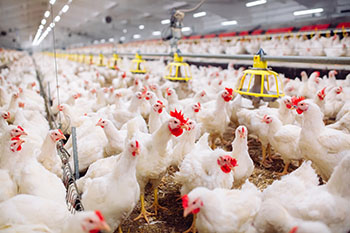Highly Pathogenic Avian Influenza Cases Increase in Tennessee
Nov 22, 2022

The Tennessee State Veterinarian is reporting a third detection of highly pathogenic avian influenza (HPAI) in the state. The latest occurrence affects a commercial chicken facility in Bledsoe County.
Following a sudden spike in deaths in the flock, testing at the C.E. Kord Animal Health Diagnostic Laboratory in Nashville and the National Veterinary Services Laboratory in Ames, Iowa, confirmed the cause was H5N1 highly pathogenic avian influenza.
“I cannot emphasize this enough — flock owners must be aware of the threat and focused on protecting their birds,” said Tennessee State Veterinarian Dr. Samantha Beaty. “HPAI is circulating in our environment and in the wild bird population. We anticipate more detections as we move through fall and into winter. Strong biosecurity is the best way to protect the health of backyard and commercial flocks.”
HPAI is a highly transmissible disease known to be deadly for domesticated fowl. Fowl can be exposed to HPAI through human interactions and contact with wild birds. The cases this year in Tennessee have sickened chickens, geese, and ducks in Obion, Tipton, and now Bledsoe Counties.
Animal health officials have established a 6.2-mile control zone surrounding the affected facility. Within the zone, poultry will be tested and monitored for illness, and poultry movement requires permitting until the zone is released. Animal Health staff members are visiting poultry owners in-person within the control zone to explain the situation, answer questions, and provide information. If you have concerns about your location, please email Animal.Health@tn.gov or call 615-837-5120 and staff will help determine if your flock is within the zone.
Although HPAI does not pose a food safety risk, no infected poultry will be allowed to enter the food supply. Poultry and eggs are safe to eat when handled and cooked properly. The risk of human infection with avian influenza during poultry outbreaks is very low. In fact, no transmission to humans was reported during the outbreak that affected commercial poultry farms in Tennessee in 2017.
Guidance for Bird Owners
Find more biosecurity tips and HPAI resources online at www.tn.gov/agriculture/businesses/animals/animal-health/avian-influenza.html.
State officials and partners have extensive experience in effectively containing the virus. Control of avian influenza includes coordination of resources and response, and protocols for quarantine, testing, disposal, cleaning, disinfection, and monitoring.
In Tennessee, more than 600 family farms contribute to the commercial poultry industry. The state is a global leader for primary breeders, and an estimated 45% of the chicken consumed worldwide traces to genetics from Tennessee operations. Broiler chickens are among the state's top agricultural commodities, generating $376.2 million in cash receipts in 2021.
For more content like this, check out the latest issue of The Cooperator.
Following a sudden spike in deaths in the flock, testing at the C.E. Kord Animal Health Diagnostic Laboratory in Nashville and the National Veterinary Services Laboratory in Ames, Iowa, confirmed the cause was H5N1 highly pathogenic avian influenza.
“I cannot emphasize this enough — flock owners must be aware of the threat and focused on protecting their birds,” said Tennessee State Veterinarian Dr. Samantha Beaty. “HPAI is circulating in our environment and in the wild bird population. We anticipate more detections as we move through fall and into winter. Strong biosecurity is the best way to protect the health of backyard and commercial flocks.”
HPAI is a highly transmissible disease known to be deadly for domesticated fowl. Fowl can be exposed to HPAI through human interactions and contact with wild birds. The cases this year in Tennessee have sickened chickens, geese, and ducks in Obion, Tipton, and now Bledsoe Counties.
Animal health officials have established a 6.2-mile control zone surrounding the affected facility. Within the zone, poultry will be tested and monitored for illness, and poultry movement requires permitting until the zone is released. Animal Health staff members are visiting poultry owners in-person within the control zone to explain the situation, answer questions, and provide information. If you have concerns about your location, please email Animal.Health@tn.gov or call 615-837-5120 and staff will help determine if your flock is within the zone.
Although HPAI does not pose a food safety risk, no infected poultry will be allowed to enter the food supply. Poultry and eggs are safe to eat when handled and cooked properly. The risk of human infection with avian influenza during poultry outbreaks is very low. In fact, no transmission to humans was reported during the outbreak that affected commercial poultry farms in Tennessee in 2017.
Guidance for Bird Owners
- Wash your hands thoroughly before and after interacting with domesticated birds.
- Dedicate a pair of shoes to only be worn in coops or poultry houses and clean those shoes after each visit.
- Regularly disinfect any equipment used in coops or poultry houses.
- Deter wild birds from interacting with domesticated birds. Consider hanging pie pans or other noisemakers in trees or, if local rules allow, set off firecrackers intermittently or when you see vultures or geese on your property.
- Look for signs of illness and report a sudden increase in the number of sick birds or bird deaths to the Tennessee State Veterinarian’s office at 615- 837-5120 and/or USDA at 1-866-536-7593.
Find more biosecurity tips and HPAI resources online at www.tn.gov/agriculture/businesses/animals/animal-health/avian-influenza.html.
State officials and partners have extensive experience in effectively containing the virus. Control of avian influenza includes coordination of resources and response, and protocols for quarantine, testing, disposal, cleaning, disinfection, and monitoring.
In Tennessee, more than 600 family farms contribute to the commercial poultry industry. The state is a global leader for primary breeders, and an estimated 45% of the chicken consumed worldwide traces to genetics from Tennessee operations. Broiler chickens are among the state's top agricultural commodities, generating $376.2 million in cash receipts in 2021.
For more content like this, check out the latest issue of The Cooperator.